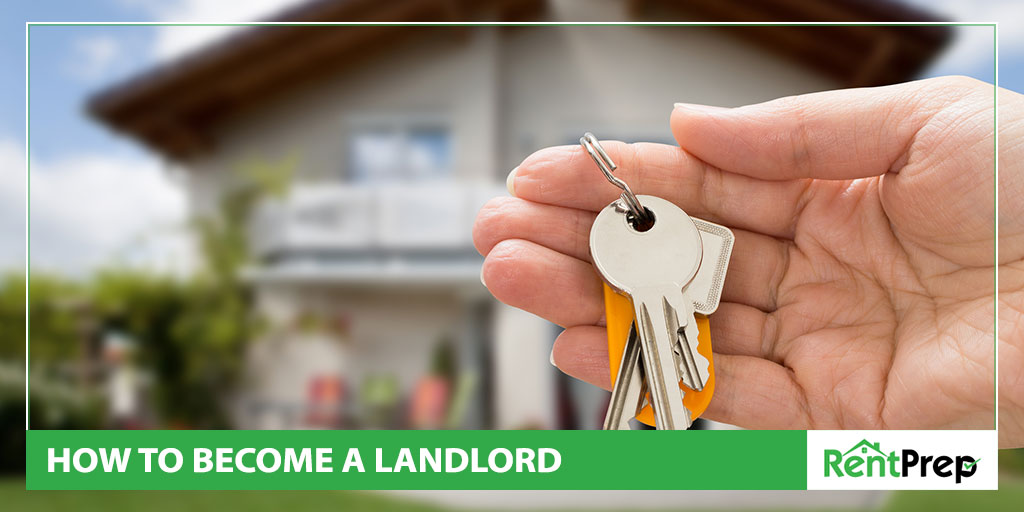
Becoming a landlord is one of the most appealing types of entrepreneurship, but it isn’t the right choice for everyone. Whether you’re wondering how to become a landlord because you inherited a property or you are considering investing in one, you need to know the risks and struggles you could face.
Being a landlord can be an enjoyable and profitable job but it is not without its challenges. Jumping headfirst into the rental industry without knowing what you are getting into can lead to huge losses, stress, and too many problems for any one person to handle alone.
Before moving forward with investment properties, take some time to learn what it takes to be a successful landlord with this complete guide.
A Table Of Contents On How To Be A Landlord
- What Is A Landlord?
- Being A Landlord: The Pros And Cons
- How To Become A Landlord: Step-By-Step Guide
- FAQs About Being A Landlord
What Is A Landlord?

By definition, a landlord is someone who owns property and rents or leases it to others for their use. In practice, being a landlord involves much more than that single sentence can convey.
Landlords are responsible for upholding all the points made in their local landlord-tenant laws. These landlord responsibilities include, but are not limited to, the following:
- Maintaining the condition of the property
- Turning over the property during vacancies
- Responding in a timely manner to all tenant requests
- Collecting rent and giving out rent notices, as needed
- Writing and signing lease agreements
- Paying utilities, as needed
- Keep all vital services (i.e., heat and electricity) working properly
- Managing rent and security deposits
Beyond what is required of landlords by state and local laws, landlords are also responsible for managing their own income, taxes, bookkeeping, and more for their rental business. In a single day, a landlord might need to do jobs in five different sections. It’s all in a normal day’s work when you’re a landlord!
Being A Landlord: The Pros And Cons
As with any job, there are benefits and negatives to becoming a landlord. When you’re considering whether or not this investment-based job is going to be a good fit for you, it’s best to think about your expectations.
By thinking deeply about what you can and cannot handle in your work, you will get a better idea of whether becoming a landlord will suit you.
Benefits
- Good source of somewhat passive income
- Tax benefits and deductions
- Property equity
- Property appreciation
- In control of your own business
- Relatively low-risk, depending on the market
Pain Points
- Large time investment
- Liability of owning properties
- Long-term investment
- Vacancies
How To Become A Landlord: Step-By-Step Guide

Now that you know some of the pros and cons of entering the rental industry, let’s talk more about how you can actually go about becoming a landlord. Generally speaking, the following steps should be done in this order.
However, you should be prepared to handle all steps of the process earlier, rather than later. By doing things like preparing your lease template before you even start advertising your first property, you will be setting yourself up for successful tenancies.
Step 1: Research
The very first step of becoming a landlord is doing research. Understanding the market, the rules, and the responsibilities of being a landlord before you take any other steps are key. You’re already on the right track by reading this guide!
In particular, gather the following information. Read into it as much as possible. Keep copies of regulations, and other documents, on hand for easy reference. You want to build your own personal reference library.
- Landlord-Tenant Laws
Familiarize yourself with local and state landlord-tenant laws. Local laws tend to be the most restrictive, and they will take priority over the other levels. These laws dictate the setup for all landlord-tenant relationships and transactions. - Local Rental Market
Next, do some research about the local rental market. What type of units are most commonly found? What is the rent price like? How common are vacancies? Research this information as much as possible. Use rental advertisements as a source of information as well. - Local Landlord Advice
If possible, connect with some local landlords about how they do business in the area. While landlords are technically in competition with each other, most are ready and willing to share some advice. After all, there are more properties out there than they alone can manage!
Step 2: Analyze And Choose A Property
Next, it’s time to choose your first investment property. If you already own the property you plan to rent, you can move to the next step.
You need to take the time to crunch the numbers. Determining whether or not a property is likely to be profitable can, and must, happen before you make your investment. If you are not financially prepared to purchase a property or you choose a property that will take a long time to see any returns on, you are setting yourself up for additional struggles.
Calculate your expected cash flow. Consider what your upfront costs and expenses will be, and compare those numbers to the project rental income. How long will it take you to see any returns? How much of a down payment will you need to make on the mortgage?
Rental property investment is not a quick get-rich scheme; it is a long-term investment. Analyze all considered properties to ensure you will be on the right track.
Step 3: Plan And Budget
Once you have a property, it’s time to make your specific financial plans. Start by buying landlord insurance; this will protect you and your property from unexpected damages from the get-go. From there, it’s time to set your budget.
Every landlord will have different expenses, costs, and projected profits. Regardless, you need to set up a budget for how much you are willing to put into the property and what you expect to get out of it. This can be adjusted over time but should be set up as an early form of structure for your business.
Step 4: Prepare The Property
Depending on the condition of the property, it might be time to do some renovations. Repainting, changing floors, replacing appliances, and more can help to make your property more attractive to renters. The property needs to be clean, habitable, and move-in ready.
Preparing the property for tenancy must be done before you begin showing or advertising the property. The final step of preparation is to set the rental price. Set your price based on the local rental market and property amenities.
Step 5: Market The Property
Once the property is move-in ready, it’s time to market the property. Your rental listing should include information that will entice and inform renters:
- Rental price
- Security deposit
- Expected lease terms
- Bedroom/bathroom count
- Square footage
- Included appliances
- Any special amenities
- Pet rules
- Income requirements, if applicable
To find out what people in your area are looking for, check out local listings. This will give you an idea of what successful landlords in your area are using to draw people in to rent their properties.
Step 6: Screen Tenants
After your rental advertisements go up, you’ll begin to receive tenant applications. Screening through these applications thoroughly and methodically is key for having a successful rental experience.
Choosing the right tenant is a make-or-break-it situation for many landlords. Great tenants will pay rent on time, keep the property in good condition, and be enjoyable to communicate with. Other tenants will miss payments, break things, and otherwise, cause extra headaches.
That is why thorough and accurate tenant screening of employment history, income verification, background checks, credit checks, and more is so important. To ensure you get the most out of tenant screening, hiring a tenant screening service may be helpful.
Remember, you must always follow Fair Housing Laws while choosing tenants.
Step 7: Set Up A Lease Agreement
The rental agreement or rental lease is a very crucial document for your rental business. This binding legal document sets up the rules and expectations for all aspects of the tenancy period. From what you as a landlord will need to do to what the tenant must keep track of, the lease contains all of this information.
You must create a strong lease agreement not only to protect your business but also to ensure that you and your tenant are on the same page about important things. Setting up a lease agreement template that you can customize for each tenant is a great way to save time while making sure you do not forget anything.
Learn more about how to write your lease agreement, and see a great template, here.
Step 8: Upkeep
Once your tenant has moved into the rental property, you may feel like there’s nothing left to do. While it’s true that you can take on a more passive role at this time, there are still many responsibilities on your checklist. From managing tenant problems to doing regular property maintenance, you will need to ensure that upkeep goes smoothly.
The upkeep routine for every property will be different, but the key point remains that upkeep must be continued even during tenancy periods. Your job as a landlord never really stops!
FAQs About Being A Landlord
What Should You Know Before Becoming A Landlord?
Before becoming a landlord, you should be aware that this is not a passive job. Many people have the wrong idea that real estate investment always generates passive income. As a landlord, however, you are actively involved in every step of your rental business.
If you are looking to get into the rental industry more passively, you should do research into hiring a property manager. This will allow you to become a more passive landlord.
What Does Being A Landlord Entail?
Being a landlord requires that you keep up with all the responsibilities outlined in the landlord-tenant law as well as in your lease agreement with each of your tenants while also running your business.
Generally, this means you are responsible for the following:
- Collecting rent
- Maintaining the property in habitable conditions
- Filling vacancies
- Organizing repairs
- Keeping track of payments, expenses, and more
- Renovating and cleaning properties as needed
- Handling security deposits
- Finding solutions to tenant problems
- …and much more!
Can I Become A Landlord With No Money?
While it will be more difficult than putting down your own down payment, it is possible to become a landlord with no capital of your own. You have options to finance your rental property purchase:
- Find an investment property lender
- Find a partner with capital to invest
- Take over an existing mortgage
- Ask for seller financing options
- Rent out a property you already own
Is Being A Landlord Profitable?
As with all types of investment, there is no guarantee that becoming a landlord will be profitable. That being said, the rental industry generally creates low-risk, long-term investment situations.
To be profitable, you need to be sure you are always focused on your business. By skipping important steps like budgeting, maintaining properties, or managing tenant relationships, you’ll be putting your profits at risk.
How Do I Become A Successful Landlord?
The key to becoming a successful landlord is two-fold.
First, you need to be prepared to work hard. Being a landlord can be trying, especially when you are first getting started. At some point, you will make mistakes, and you will lose money. As long as you are ready to keep working hard, however, you will learn, grow, and profit as you continue your work.
Second, you need to be prepared to work smart. There are many ways to make your job as a landlord easier and more efficient. From hiring a tenant screening service to setting up a repertoire of template documents for every situation, you can be prepared for anything that might crop up. Working smart is essential.
Are You Ready To Be A Landlord?
Now that you know how to become a landlord, do you feel you are ready for this challenge?
Being a landlord isn’t always a walk in the park, but it is an incredibly rewarding job. Not only are their financial rewards, but it is also very rewarding to make money from something you put your heart and soul into.
Are you ready to become a successful landlord? Your journey already started today; you can do this.

